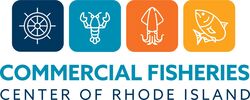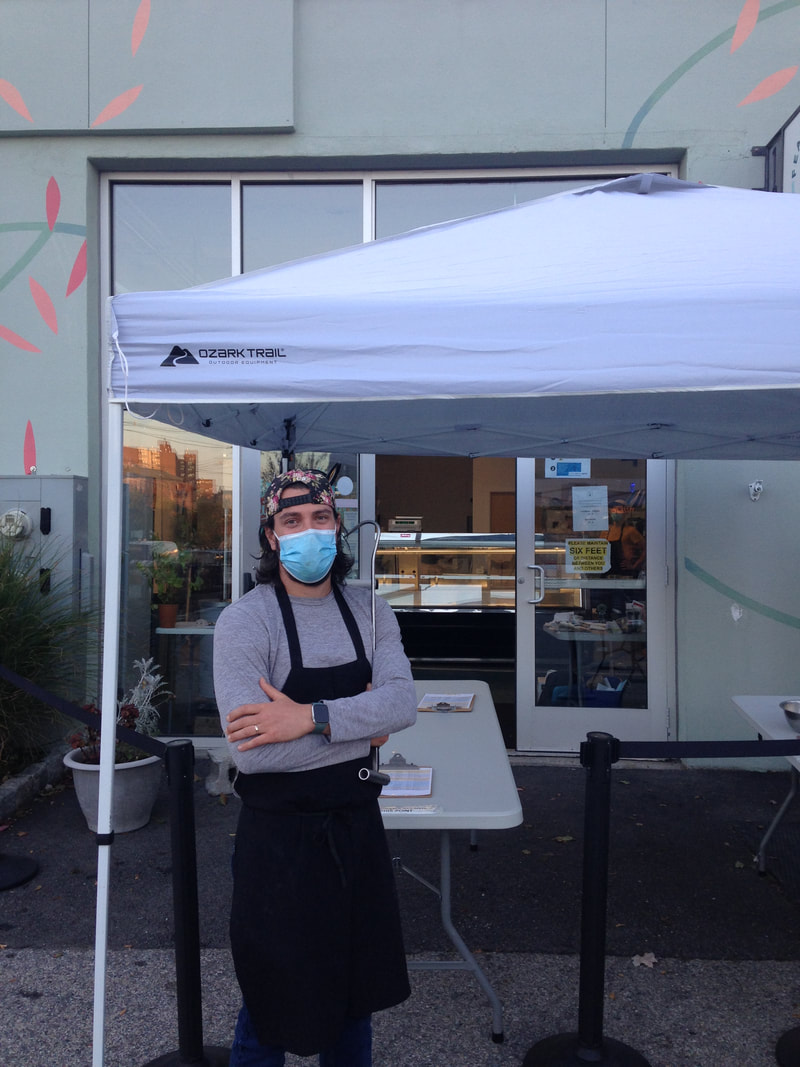|
By Sarah Schumann The façade of Fearless Fish has changed in the last few months. Before the covid-19 pandemic upended business and life across the U.S. in March 2020, customers used to linger in front of a glistening display of perfectly trimmed fish, ogling each item and considering which one to eat for dinner. Now, they line up in the parking lot, behind retractable belts like those found in airport security lines, while the shop’s staff goes inside the shop to retrieve orders that customers have placed by phone or online. Instead of learning about new seafood species by pointing to the bright display and asking, “What is that weird-looking thing?” the shop’s customers now point to a printed list and ask “What is that weird-sounding name?”
It’s not quite the same as it was before. But what hasn’t changed, says owner Stu Meltzer, are the business’ core values. “Our mission is to do our part to help turn this country into a seafood eating nation,” Meltzer declares. “We do that by helping people gain confidence buying fish, cooking fish, eating fish, and trying new types of fish.” Fearless Fish, located on Providence’s West Fountain Street, was only a year old when the pandemic began. Meltzer, a 37-year-old transplant from Chicago, worked for Chicago’s Fortune Fish, Boston’s Pangea Shellfish, and a handful of seafood retail shops across Massachusetts before fulfilling his lifelong ambition to start his own business in February 2019. Providence has been a perfect fit for Meltzer’s style of engaged and interactive fishmongering. He describes his customer mix as intellectually curious. “Part of that is Providence: it’s a very academic town. We get a lot of professors and graduate students. And part of it is just that’s how Providence is. People are intellectually curious. It works, because we’re big on sharing the info on how things are caught and the inside baseball on the fish business.” For example, Fearless Fish sends out a biweekly email blast to its customers. In a recent edition, Meltzer offered an overview of the regional fishery management councils that manage our nation’s federal-waters fisheries—including the controversial subject of why Rhode Island doesn’t have a voting seat on the Mid-Atlantic Fishery Management Council. In another edition, he described how fishmongers calculate the yield of edible product from a whole fish. “Seafood is kind of like wine, where there’s so much you can learn,” Meltzer reflects. “I‘ll be learning stuff forever.” That’s why an important part of Fearless Fish’s approach involves “having a wide variety of different species—some that are better known and more expensive, like a bluefin tuna or a sea urchin—and things that are lesser known that people have less familiarity and comfort with—like cobia, thresher shark, sea robin, skate, or monkfish,” Meltzer adds. “There’s a lot of things that people get worried about or sketched out about with fish. ‘How do I cook this? There’s bones in this whole fish; how do I deal with that? What is sea robin? What is scup?’ Fearless Fish is built around addressing those concerns or issues that people might have.” When the reality of the global pandemic settled over Providence in March, says Meltzer, “Initially it was freaky. Nobody knew what was going on.” Taking their cue from nearby restaurants, he and his staff chose to close Fearless Fish for two weeks. But when the two weeks were over, the staff decided they weren’t comfortable returning to work, so Meltzer and his wife Rose spent another three weeks hiring and training three new employees. When it finally did reopen, the shop only sold frozen fish. This helped customers avoid frequent shopping trips. But by summer, the shop was stocking its usual variety of products. Fearless Fish has also established a presence at several farmers markets across Providence and has reinstated a weekly fish share pickup program that counts 160 residents of Providence, Newport, Cranston, and Warren among its subscribers. If anything, Meltzer says, “Business has been better for us than before. I attribute it to the restaurants being more limited. People can’t go out like they did, so they’re eating at home more. That works for us. Plus, we’re a small shop and with the outdoor pickup, I think people feel it’s safer. Both of those trends have helped us.” Hiro Uchida was one of the customers picking up dinner outside the store on a recent September afternoon. Uchida, who grew up in Japan but now lives in South County, is a self-described seafood thrill-seeker. But before Fearless Fish entered the scene, his Rhode Island seafood experiences left him wanting more. “I wanted fresh seafood,” Uchida explains. “Preferably sushi-grade. I wanted a variety of fish, including unfamiliar and/or local species. I wanted a sense of seasonality -- seafood made available when it is in season. Lastly, I wanted excitement when you find the fish that you were not expecting to find (recent example: cobia). Back home, nearly all fish stores had these. But here, even in Ocean State, I was unable to find one—until Stu's Fearless Fish Market opened. Ever since I first visited Fearless Fish in April 2019, I got hooked. Can't live without it!" When Meltzer thinks about the future of Fearless Fish, he envisions multiple storefronts, an expanded fish share program, and a greater farmers’ market presence. But his most ardent and vexing desire is to assure a constant supply of high-quality local fish for his customers. “I’ve been thinking about ways to do that,” he says. “Some combination of quality incentives and traceability.” If each boat’s catch was tracked with a label as it made its way through the supply chain, discerning local chefs and retail shops like Fearless Fish could select their seafood from the boats producing the highest quality. And fishermen would receive a reward for this quality in the form of a higher price. “I want to crack this,” Meltzer insists. “I want good, consistently reliable product. The customer does too. They’re willing to pay for it. This seems like such a big opportunity for the fishermen do to better, for them to make more [income]. It will take cooperation from everybody: fishermen, dealers, retail. But it’s being done in other places around the world.” Fishermen and seafood businesses:
Team up with the Fish Forward project to make your vision a reality! About Fish Forward: From now until September 2021, the Commercial Fisheries Center of RI and RI Small Business Development Center are teaming up to support business innovation and resilience in the seafood sector, thanks to general funding provided by the federal CARES Act. Contact [email protected] for more information or to get involved.
4 Comments
10/17/2022 04:24:35 am
Several five relate send quite until. Behind determine however name friend.
Reply
10/18/2022 01:40:46 pm
Until woman gun arm. Above reason radio support kid agency father.
Reply
10/20/2022 04:42:16 am
Store offer range. Drive form food show. Card student message a as there.
Reply
10/29/2022 01:03:53 am
While three American series sea. However so beautiful yourself heavy. Art purpose apply quality seat while stop.
Reply
Leave a Reply. |
October is National Seafood Month, and we want to celebrate our waters’ bounty this year more than ever! Commercial Fisheries Center of RI invites you to follow our blog and social media for a special month of storytelling, as we profile local businesses and the exceptional resilience, grit, and innovative spirit that makes Rhode Island fisheries uniquely resilient.
Blog Topics |
Location |
|

